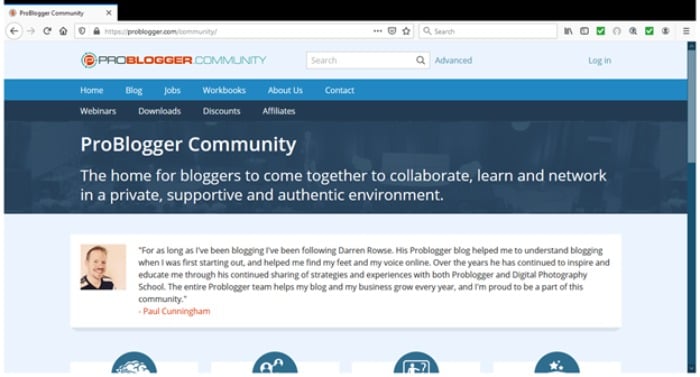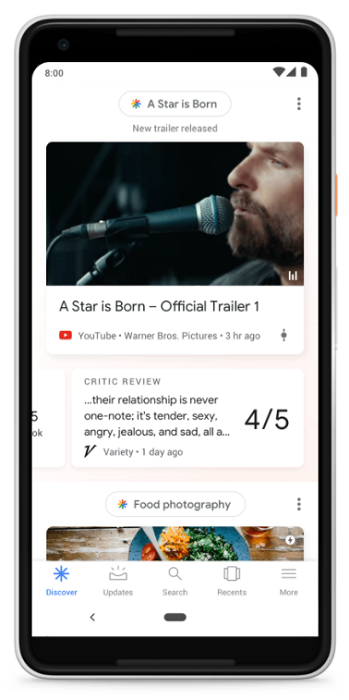
Organizations that have made consistent and sound investments in content marketing have reported those investments paying dividends in recent years.
However, to maintain their growth, marketers must also stay tuned into the ever-changing content marketing landscape.
What worked last year may not be enough to creep ahead in 2021.
Being able to anticipate trends and changes in audience behavior based on technology trends and updates can help you adjust your strategy and get ahead of the wave.
Here, we’ll detail some trends to keep an eye on in 2021, but before we do, let’s look at why content marketing keeps evolving.
Why Does Content Marketing Change so Frequently?
Content marketing continues to evolve to keep pace with trends, technologies, and consumer demands. For instance, increasing use of mobile devices, voice search, and social media all require us to stay on top of things.
Then there are the platforms themselves that change. Established sites like Facebook have started to attract an older demographic, while newer platforms like TikTok appeal to a younger audience.
To reach their audiences effectively, content marketers must adapt their strategies to meet these changing trends.
10 Current Trends in Content Marketing
More recently, adaptability and flexibility have been central to content marketing. However, many of the preferred marketing methods remain the same.
Although many current content marketing trends are a continuation or evolution of existing ones, some trends are gaining considerable ground.
1. Building Communities
With as many as 24 million e-commerce stores out there, you need to find a way of getting noticed.
You achieve that in such a crowded space by developing a community.
Community marketing isn’t about getting a quick sale—it’s about engaging with customers while building trust and loyalty and reaching a wider audience.
The Dollar Shave Club (DSC) is an excellent example of this. DSC works on a subscription basis and considers all of its members a part of the community.
In addition to its social media presence and a blog to engage with customers, DSC features members in its monthly newsletter and ensures its subscribers are at the heart of the business.
Then there’s ProBlogger.
You might know ProBlogger from its jobs board or its blog. However, its community side is a considerable part of the brand too. The community gives new and established bloggers the chance to come together and learn and collaborate.
It also offers:
- networking opportunities
- webinars
- discounted books, tools, and events
- community downloads

2. Optimizing Content for Niche, Long Tail Keywords
For a long time, the focus for marketers was long-form content. However, more recently, content marketing has stepped back from detailed, lengthy article guides. Instead, the use of niche, long-tail keywords is becoming more prevalent, as long-tail keywords are more specific and have less competition.
Further, using long-tail keywords makes it easier to get your content ranked on Google. That means more organic traffic, which is good news for marketers targeting a competitive niche.
Finding these long-tail keywords needn’t been difficult. You’ll find there’s plenty of free and paid-for tools available, such as:
- Ubersuggest
- Semrush
- Wordtracker
- Moz.com
You can also use:
- the “people also searched for” feature on Google
- Google Suggest
- Google’s related search
Once you’ve narrowed down your keywords, you can then focus on a specific segment of your business and create content around the subject.
3. Hiring Content Teams With Diverse Skill Sets
In recent years, there’s been a consistent shift away from content churning.
The brands experiencing the most success with content marketing aren’t just flooding their audience with content. They’re taking a media publishing approach.
The process is just as important as the content itself now. Having a team of writers isn’t enough anymore.
Your company needs to create a broader strategy with a more diverse group of talent and skills to meet your audience’s demands.
That means good writing isn’t enough. The content team will need to grow and adapt for the next year and should include people who have talent in:
- video production and editing
- graphic design, illustration, and editing
- audio editing and production skills
- content optimization
- content distribution and promo
- strategy development, execution, SEO, and campaign management
- communications and branding
4. Repurposing Content Across Channels
Repurposing content saves time, gets you in front of a different audience, and enhances your organic search.
This simply means repackaging it into a different format. For example:
- turning blog posts into an eBook or newsletter content
- embedding YouTube videos in your blog
- transcribing your YouTube videos and distributing them as podcast, newsletter, or blog content
- creating infographics from research and stats.
ESPN showed how effective content repurposing could be. When ESPN launched “We the Fans,” it distributed the content across a range of formats. Articles, podcasts, videos, and social media were all part of ESPN’s strategy.
As Chad Millman, VP/editorial director of U.S. digital content, explains, “The idea was to take advantage of all of ESPN’s platforms.”
You should consider doing the same for your business.
Content Marketing Trends for 2021 and Beyond
Looking forward, the need for marketers to adapt their content plans will continue, and we’re likely to see a greater increase in existing trends like Google’s Discover and stories to engage readers and keep them on the page.
Let’s take a closer look at these content marketing trends.
5. “Discover” Features
Yoast, Search Engine Land, and HubSpot are just some of those talking about Google Discover. It was formerly known as Google Feed, but it’s undergone a significant transformation since its launch.
If you’re not familiar with Google Discover, it combines news, evergreen content, along with visuals like photos. To fill the feed, Google uses AI and machine learning to understand a user’s search history, meaning the viewer gets content likely to engage them.
You’ll find Discover on Google’s mobile pages, and mobile Chrome users will see the feed when they open a tab.

Over time, Discover becomes increasingly sophisticated. Just ask the Vogue and Vice’s publishers.
Your content is eligible to appear on Discover if it meets the guidelines and Google has indexed it. However, as Google states, it doesn’t guarantee your content will appear in its Discover feed.
Google does, however, have some guidelines to improve the chances of your content showing up.
These include:
- posting “outstanding and engaging content”
- creating content that’s unique and timely
- providing exact authorship details (your name, publication, bylines, publication)
- high-quality imaging
- descriptive titles that avoid clickbait
6. “Story” Features
Stories are growing in popularity for several reasons. First, they make great social media content. Secondly, they’ll also show up in mobile searches and Google Images, increasing your chances of discoverability.
There are other factors in their growing popularity: platforms like Google Stories make story creation accessible to everyone.
Crucially, though, Google Web Stories cater to consumers’ business lifestyles and provide content for people on the move: the use of Accelerated Mobile Pages (AMP) allows readers to flick through the same way you would with social media stories.
Another example of story features is Instagram Guides. These provide curated content in the form of videos, photos, and text. The idea is to make content easier to find, therefore making brands and influencers easier to discover.
7. Featured Experts
Commentary from experts that lends credibility to your content can help you stand out. That’s why including comments from a subject matter or featured expert could benefit your content’s performance.
Google doesn’t use subject matter content as a ranking factor (yet). However, evaluators consider the expertise, authoritativeness, and trustworthiness (EAT) factor in their quality rankings.
Google isn’t the only one interested in the quality content, though. Consumers are too.
According to a Nielsen study, 85 percent of consumers regularly or occasionally look for expert content before buying.
Additionally, 67 percent of buyers say unbiased expert endorsements make them more likely to consider a purchase.
InPowered, who commissioned the survey, says there are three main takeaways from the research. Marketers should:
- build trust and cut through the noise with expert content
- begin to share their stories once they’ve gained consumers’ trust
- continue to build trust through expert content and ask customers to leave reviews
8 & 9. Generative Media & NLG
Generative media is increasing in use the same way that natural language generation (NLG) is. Like NLG, generative media uses AI to create content. The only difference is it makes computer-generated images rather than text.
It works in much the same way as NLP too:
- The designer gives their instruction to the machine, detailing parameters/algorithms.
- The machine uses these parameters to create an image.
However, the designer still has some input and can alter algorithms to produce the finished piece.
Tyler Lastovich of Lastly Studios predicted growth in generative media some time ago. As Lastovich points out, although there’s been a surge in use, we’ve yet to see its full potential. For instance, content marketers could use it in areas like:
- contextual images
- personalized content
- realistic chatbots
According to a senior analyst at Techna, trial versions of generative design, cloud-based generative design solutions, and the rising integration of 3D printing with generative designs are just a few of the reasons behind this content marketing trend.
10. Content Driven Personalization
Yieldify defines content personalization as the “process of tailoring content that is visible to the customer based on their profile or preferences.”
Every customer who visits your website is at a different stage of the customer journey. Your content should cater to their specific needs and encourage them to take the next step.
A good example would be a customer that comes to your website to find out more about new kitchen units. When they return to your site, you could offer an e-book offering tips on choosing the ideal kitchen units for their home or a checklist on preparing for the revamp.
In case you’re wondering, content-driven personalization isn’t optional if you want to keep your customer satisfied. Research from Salesforce shows 84 percent of consumers say being treated like a person, not a number, is crucial to winning their business.
Further, fifty-nine percent say tailored engagement based on past interactions is crucial to winning their business.
Conclusion
While data support the trends listed here, trends aren’t everything. You should do your research to see how they can improve your content marketing strategy moving into 2021.
There’s also plenty of historical data that shows us how quickly trends can flop or die off.
Rather than chase content marketing trends, always do your research. Keep an eye on top performers in your space and use data—as well as experimentation—to fuel your strategy as you head into 2021.
Which of these content marketing trends for 2021 are you working on incorporating into your strategy?
The post 10 Content Marketing Trends for 2021 and Beyond appeared first on Neil Patel.
This marketing news is not the copyright of Scott.Services – please click here to see the original source of this article. Author: Neil Patel
For more SEO, PPC, internet marketing news please check out https://news.scott.services
Why not check out our SEO, PPC marketing services at https://www.scott.services
We’re also on:
https://www.facebook.com/scottdotservices/
https://twitter.com/scottdsmith
https://plus.google.com/112865305341039147737
The post 10 Content Marketing Trends for 2021 and Beyond appeared first on Scott.Services Online Marketing News.
source https://news.scott.services/10-content-marketing-trends-for-2021-and-beyond/
No comments:
Post a Comment